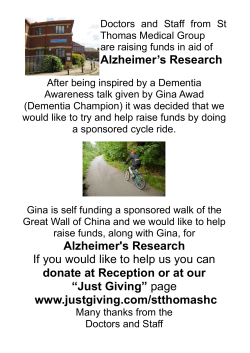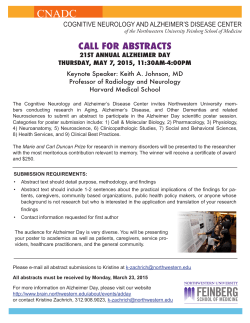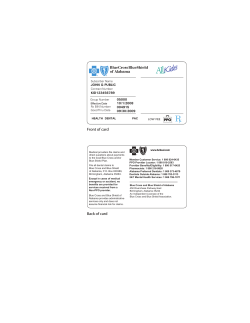
ACA Spring 2015 - Alzheimer`s of Central Alabama
A L Z H E I M E R ’ S O F C E N T R A L A L A B A M A The Alzheimer’s Update A LocAL Organization Helping LocAL Families Spring 2015 Focus on Brain Health Successful aging starts at a young age and continues throughout life! Consider making these healthy lifestyle choices: Control the risk factors for Alzheimer’s by managing diabetes, obesity, depression, heart disease and high blood pressure. Avoid the evil 3: poor diet, inactivity and smoking. By eliminating the Evil 3 you can decrease your risk of heart disease, stroke and Type 2 diabetes which will lower your risk of Alzheimer’s disease. What is good for the heart is good for the brain! Nourish your body, mind and soul. Nourish your body! Don’t be a couch potato! Walk 30 minutes a day; do aerobic activity and weight training. No smoking! Stay trim by eating a balanced diet. Limit alcohol. Take a daily vitamin. Nourish your mind! Engage in mental exercises like puzzles and word games. Try new things and learn new skills. Talk to someone other than your patient about something other than caregiving every day. Nourish your soul! Maintain a healthy, positive attitude. Be engaged with others and socialize. Nurture your spirit through religious involvement and a spiritual life that has meaning for you. Manage your stress. Try a daily dose of vitamin H – Humor. Laugh and play every day! Sit down at the table and eat colorful dark skinned fruits and vegetables; vitamin E rich foods like blackberries and spinach; beta carotene rich foods like broccoli and sweet potatoes; whole grains; omega 3 fatty acids like salmon and sardines; antioxidants like blueberries and walnuts. Push away from the table and avoid fried foods, processed foods, salt, added sugars, saturated fats, transfatty acids and red meat. See your doctors regularly for cardiovascular and diabetes screenings, depression evaluation, tobacco cessation, and detection of cognitive impairment. Too often caregivers give up time with family and friends and recreational activities. This can lead to problems like fatigue, difficulty sleeping, weight gain or loss, headaches, back pain. ACA’s New Ministry music ministry for community dwelling Alzheimer’s patients and their families. Music can reduce the often hopeless isolation of dementia by creating moments of joy and opportunities for playful engagement. With funding from the Alabama Department of Senior Services, the project, iComfort: Listening to Remember, uses personalized iPods especially created for patients. ACA Provides: • Scholarships for 50 patients to attend adult day care each month • Continence supplies for 80 patients each month • Funding for 22 research grants Imagine - music inspiring memory. Alzheimer’s of Central Alabama (ACA) and Dawson Baptist Church are collaborating to create a special alzca.org The reaction of the patients, when they hear the music they love, is powerful. Music can spark recognition and reduce behavioral symptoms. By giving families living with dementia the tools to incorporate music into their daily routine, we hope to reduce caregiver burden and improve quality of life. ACA and church volunteers have collected CDs from all music genres. Caregivers can select the types of music they feel will have the biggest impact. Research has shown that personalized music playlists, heard on iPods have the capacity to transform quality of life 205.871.7970 or 866.806.7255 Support your brain and physical health by staying connected to family and friends, staying physically active, asking for help when needed, finding time to relax, and nurturing your spiritual life! Adapted from the Alzheimer’s Foundation of America. ACA Development Campaign These generous donors have demonstrated exceptional leadership and support through their gifts and commitments. These gifts are pledges from September 2014 to March 2015. Named endowment gifts & Legacy gifts ($25,000 level & above): C. Phillip McWane Anne and Mike Warren Legacy Gift Club or planned gifts ($1,000 level & above): Ruth and Charles Ash Nancy and Steven Chazen Sally and Richard Friedman William Goodrich Brenda Hackney Sheryl and Jonathan Kimerling DeDe and David Pittman Annual Campaign Leadership Donors ($1,000 & above): Judy and Hal Abroms Christy and Allen Baynes Christine Clark Lyndra Daniel William Engel Nancy and Glenn Goedecke Jillian and Michael Goodrich Kathryn Harbert Sarah and Mike Harfield Marion Head Ronne and Donald Hess Susan and Tom Lowder Nancy and Murray Smith for patients struggling with Alzheimer’s and dementia. Dawson Baptist Church has also started a special choir for patients, The Unforgettables, which will meet for 13 weeks of rehearsal prior to a public performance. Alzheimer’s is a long term illness, which challenges us to find creative solutions for caregivers. Because music is profoundly linked to emotion, this new outreach ministry is a perfect solution for soothing the soul. To volunteer, or if you have a loved one who would benefit from this ministry, contact ACA. facebook.com/alzca ALZHEIMER’S OF CENTRAL ALABAMA Garden Art Party Alzheimer’s in Alabama: Present and Future Saturday, May 9, 2015 7:00 - 10:00 p.m. • Iron City 513 22nd Street South 35233 Friday, July 17 ACA’s Annual Conference for Caregivers Friday, July 17, 9 a.m. - 4 p.m. Dawson Baptist Church Tickets (205) 871-7970 or www.alzca.org Call for more information or look for details on our website as the date gets closer. Our 2015 Corporate Sponsors ALZHEIMER’S OF CENTRAL ALABAMA Post Office Box 2273 Birmingham, Alabama 35201-2273 (205) 871-7970 www.alzca.org Non-profit org. U.S. Postage PAID Permit No. 1564 Birmingham, AL Located at: 300 Office Park Drive, Suite 225 Birmingham, Alabama 35223 Wandering: A Common Danger Getting lost and wandering are perhaps the two most dangerous behavioral symptoms of Alzheimer’s and dementia. Caregivers often underestimate the risk. Sixty percent of patients wander, and those who do tend to do so repeatedly. As patients progress from needing supervision to custodial care, caregivers often struggle with strategies to curtail wandering because of a reluctance to take away the patient’s independence. The dire consequences of getting lost while driving should motivate every caregiver to curtail driving before an accident happens. Jean lived in a neighborhood north of Birmingham and was only driving to “safe places,” like the beauty shop. One Saturday morning she drove off to get her hair done. Her family was notified hours later that she had been pulled over driving on the wrong side of the road 125 miles away! alzca.org It was astonishing that she hadn’t caused an accident. It was a football Saturday and she had driven straight through all the Tuscaloosa football traffic! Another caregiver would frequently leave her husband in the car when she ran errands. Telling him to wait until she returns is a foolish strategy. He can’t remember instructions and doesn’t have a concept of time. You shouldn’t leave a dementia patient in a car or in the house any more than you should leave a child. It’s not a safe practice! Since the first of the year at least two patients have wandered from home and have not been found in time. What a tragedy for these families! In both cases the patients were found within shouting distance of their homes. Securing the home with deadbolt locks or locks at the top of the door frame and out of site can 205.871.7970 or 866.806.7255 help. Alarms that sound when the door opens or bells attached to the door knob can also alert the caregiver if the patient has gotten out. ACA partners with the Jefferson County Sheriff ’s Department and the Alabama State Troopers to provide Project Lifesaver bracelets for patients at risk for wandering in Jefferson County. The bracelet emits a radio tracking signal. It is not a GPS system and is not for patients who are still driving. The program is available in 58 of Alabama’s 67 counties. For more tips to prevent wandering and for more about Project Lifesaver contact ACA. facebook.com/alzca
© Copyright 2025














